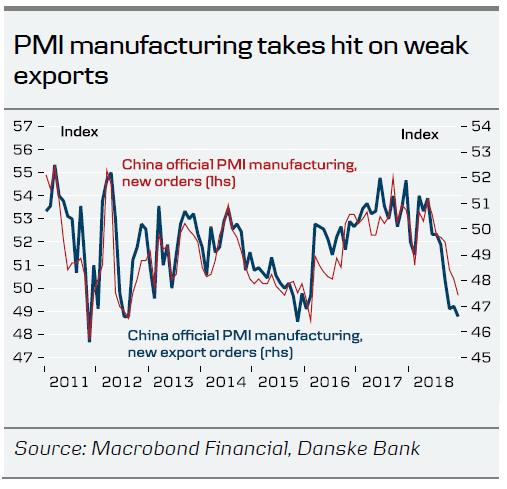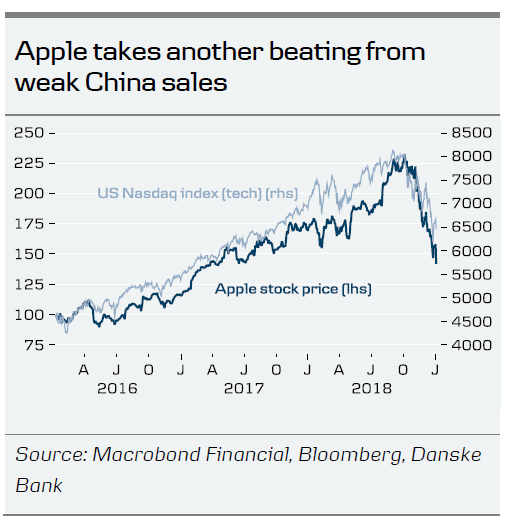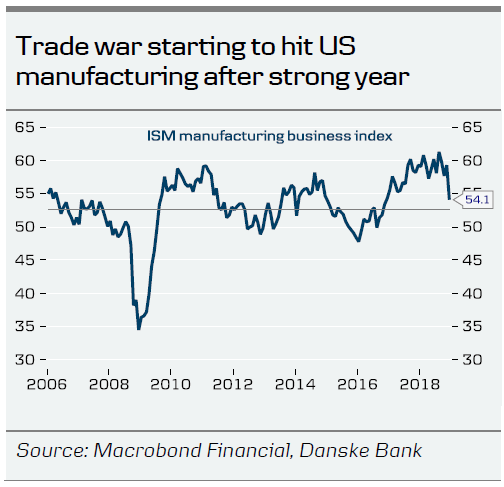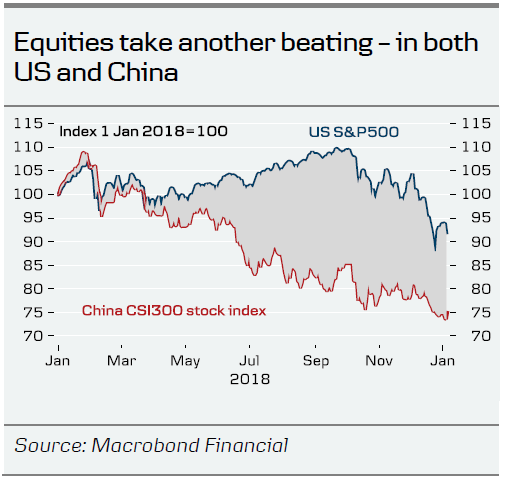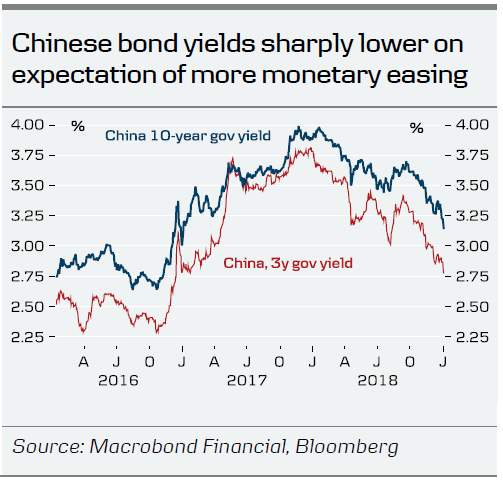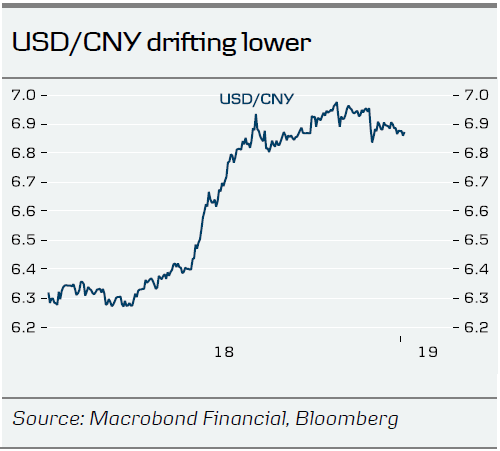- PMI survey points to very weak start to 2019 – more stimulus coming
- Apple another casualty in the trade war – both US and China need a trade deal
- Xi stresses self-reliance – and that Taiwan belongs to China
China eases policy further on weak economic data
The past week provided more evidence that the Chinese economy is heading for a rough start to 2019 . Both the official and the private version of PMI manufacturing dropped below 50 in December on the back of very weak export orders (see top chart). The news pushed Chinese stock markets and bond yields even lower (see charts on next page).
Responding to the slowdown, the People’s Bank of China (PBOC) took two steps this week to ease policy further. On Thursday the PBOC increased the scope of a targeted cut in the Reserve Requirement Ratio (RRR), that was initiated last year, see SCMP 3 January. It is estimated to free up around USD100bn of liquidity. On Friday the PBOC followed up with a reduction in the RRR for banks of one percentage point freeing up another USD116bn, see Reuters 4 January 2019.
Comment. It was widely expected that China would ease monetary policy further and more easing could very well come during H1. We are still waiting for the announcement on major tax cuts for businesses and consumers, which we expect to come soon, see also China Weekly Letter: Major tax cuts coming – trade talks on track , 20 December 2018. This week we published China Leading Indicators – Darkest before dawn , 3 January 2019. Our main message is still that we expect the economy to get worse before it gets better from Q2 on economic stimulus and a resolution of the trade war.
Apple another casualty in the trade war – deal needed soon
On Wednesday Apple made its first warning in 15 years of weaker revenues and pointed to disappointing sales in Greater China as the main culprit, see CNBC 3 January. The stock price took a further beating on the news and is now down more than 35% since early October (see bottom chart). Trump’s economic adviser Kevin Hasset said in an interview with CNN that the trade war is ‘having an impact on earnings and it’s not going to be just Apple’. He added that ‘a heck of a lot of US companies’ are likely to downgrade their earnings until we have a trade deal, see Reuters 3 January.
In another sign that the trade war is starting to hurt US companies, the ISM manufacturing index for December nose-dived and many companies highlighted the trade war in the comments in the report .
Comment. It is now very clear that the trade war is hurting big US corporates as well. On top of slower Chinese growth, there may be a consumer boycott effect. Apple is probably also a casualty of the arrest in Canada of the Huawei CFO, which has caused great anger in China. Some companies urge employees to boycott Apple – and sanction those that do not comply, see Appleinsider , 24 December.
US and China need a trade deal soon. Both sides also continue to send positive signals in this regard and will meet on vice-ministerial level in Beijing on 7.-8. January, see Reuters 4 January. We continue to look for a trade deal by the end of Q1 or in Q2. We look for a deal to ease some of the pressure on equity markets as well as both the US and Chinese economy.
Xi stresses self-reliance – and that Taiwan belongs to China
In Xi Jinping’s New Year speech he stressed that ‘China’s reforms will never stop, and its doors will open ever wider’, see Xinhua 1 January. He also pointed to self-reliance several times in the speech saying ‘Through the years, the Chinese people have been self-reliant and worked diligently to create Chinese miracles…And now, looking forward, despite the complexities and difficulties we may face on the road ahead, we shall always closely rely on the people and stick to self-reliance and hard work’.
In another speech on 2 January on Taiwan, Xi Jinping made clear that China’s clear aim is reunification with Taiwan, see Xinhua 2 January. He said China must be and will be reunited and pledged ‘utmost sincerity and greatest efforts’ for a peaceful reunification. However, he also made no promise to abandon the use of force if necessary. He said that the long-standing political differences could not be dragged on generation after generation and promised that that Taiwan’s social system and way of life would be fully respected arguing for a ‘one country, two systems’ solution. Finally he stressed that the Taiwan question is China’s internal affair and allows of no external interference.
Comment. The theme of self-reliance was increasingly brought up in 2018 as the trade war and tech war with the US gained steam. 2018 made it clear that China is vulnerable within certain technology sectors and that China needs to become less reliant on the US. On Taiwan, China has raised its voice on the plan for reunification following the increased relations between Taiwan’s independence-leaning government and the Trump administration.
Other China news
USD/CNY continues to range trade. The overall USD weakening lately has helped to put a cap on USD/CNY. Our forecast is for USD/CNY to trade slightly lower towards 6.80 in 12M.
China on dark side of the moon, see BBC 3 January. On Thursday China said it successfully landed a robotic spacecraft on the far side of the moon. It is the first ever such attempt and landing and is seen as a major milestone in China’s space programme. It can also be seen as a show of force in the technology area.
Beijing turns to facial recognition to combat public housing abuses, SCMP 28 December. Another illustration of how China uses facial recognition and AI against illegal activities.
US issues travel warning on China amid tensions over arrest over Huawei’s CFO, SCMP 4 January.
China’s next generation of weapons and military equipment nears readiness, SCMP 23 December 2018.

